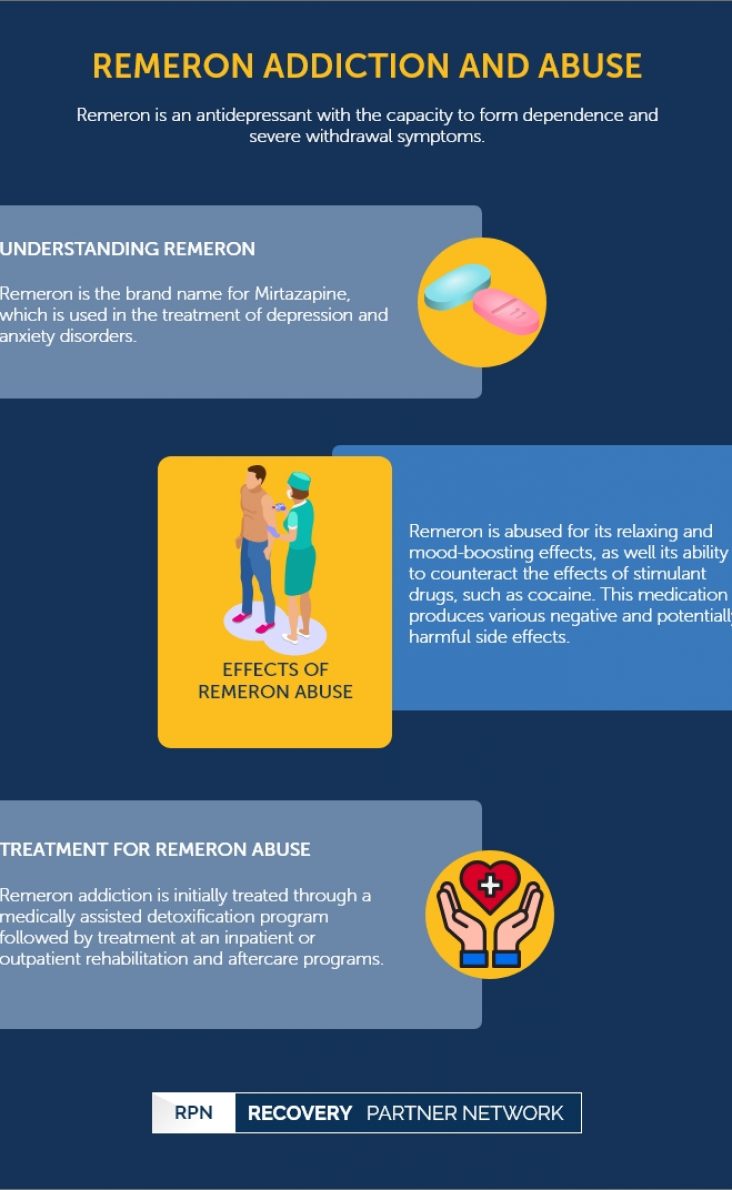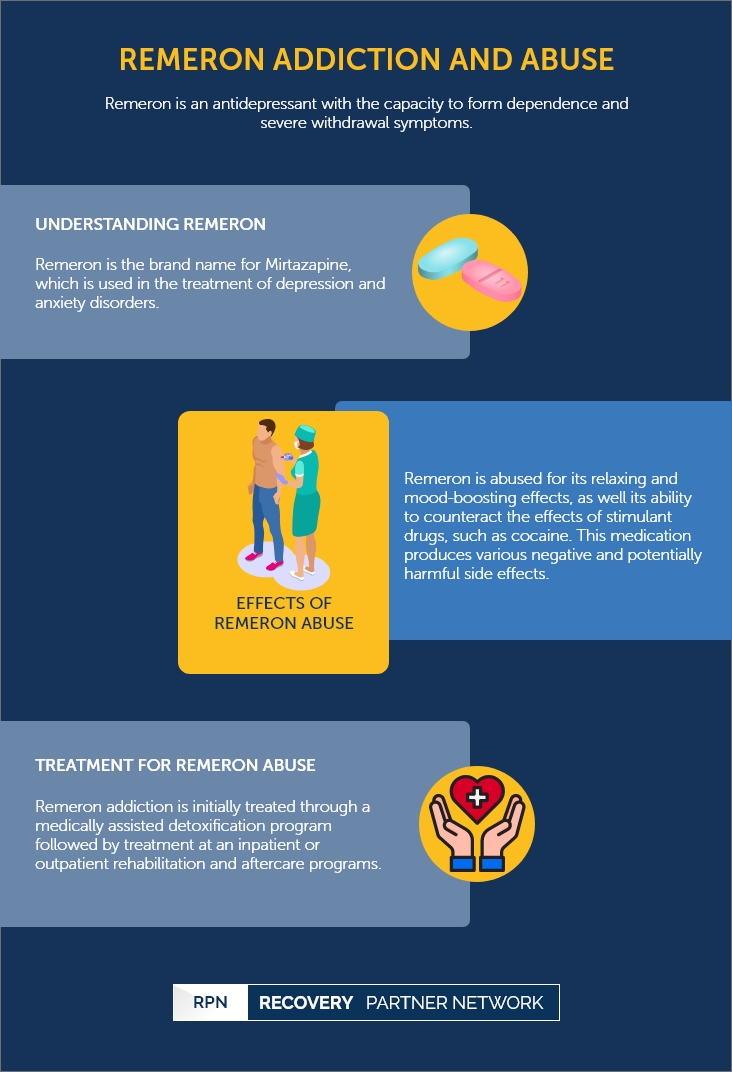Remeron is an antidepressant with the capacity to form dependence and severe withdrawal symptoms.
Remeron Addiction
Mirtazapine addiction | Table of Contents
Understanding Remeron
Remeron is the brand name for Mirtazapine, a well-known prescription antidepressant that belongs to a group of drugs known as tetracyclic antidepressants (TeCAs). Remeron is used as a treatment for depression and anxiety disorders. The drug works by changing the brain’s neurotransmitter levels and restoring the average chemical balance in the central nervous system. Remeron is generally prescribed to patients for forty weeks. The starting dose recommended for Remeron tablet is 15 mg/day, delivered in a single dose, usually in the evening before bedtime.
FAQ
There haven’t been any reported problems from the use of Remeron to date. It is a completely safe medication when used as prescribed.
Mirtazapine Dosage and Uses
According to the information provided by the Federal Drug Administration (FDA), Mirtazapine was developed by a company named Organon and was approved by the FDA in 1996. Mirtazapine is available in tablet form under dosages of 15 mg, 30 mg, 45 mg, and 7.5 mg. The 15 to 45 mg tablets often come with a dissolving mechanism. The dose is usually taken close to bedtime due to the drug’s relaxing effects. The half-life of Mirtazapine is between 20 and 40 hours, and due to its long-lasting effects, this medication is only taken once a day.
This medication was initially intended to treat major depression but has since been developed and prescribed for a variety of other applications, including:
- Insomnia
- Post-traumatic stress
- Appetite stimulation
- Generalized and social anxiety
- Sleep apnea
- Schizophrenia
- Obsessive-compulsive disorder
FAQ
Remeron is prescribed for anxiety disorders and depression.
During the first two weeks, patients may experience significant improvement in sleep, energy, and appetite. It may take approximately six to eight weeks to see improvements in depressed mood and lack of interest in activities.
The primary use of Remeron is to treat anxiety and depression, and other conditions like PTSD and nausea. Although it is not used to treat insomnia, sedation comes as a side effect of Remeron.
Effects of Remeron Abuse
Remeron helps improve the user’s mood, sense of well-being, sleep, and appetite while also reducing anxiety. In addition to these benefits, this medication may also produce various negative and potentially harmful side effects that may vary from mild to severe.
Remeron side effects may include:
- Weight gain
- Vomiting
- Diarrhea
- Body aches
- Drowsiness
- Abdominal pain
- Constipation
- Trouble concentrating
- Strange dreams
Other adverse effects, such as suicidal thoughts, behavioral changes, and increased depression, have been documented while taking Remeron. Pediatric and adult patients with major depressive disorders may experience a worsening of their depression and the development of suicidal thoughts during the early stages of their treatment.
The early stages of Remeron treatment may also cause symptoms such as:
- Increased anxiety
- Frustration
- Panic attacks
- Irritability
- Hostility
In rare cases, certain individuals may also develop a severe condition known as serotonin syndrome. Since Remeron increases the production of serotonin, high doses of this medication, or the intake of Remeron with other drugs that produce more serotonin, may cause the development of serotonin syndrome.
The emergence of these negative side effects is significantly increased when the medication is abused. The use of Remeron without a prescription or outside the boundaries of the prescription is considered abuse. While Remeron does not generate a euphoric high like most other drugs, individuals still abuse it for its relaxing and mood-boosting effects. Many individuals abuse this medication by using it to counteract the effects of stimulant drugs, such as cocaine. Diverted usage as such increases the risk of serious complications, such as abdominal cramping, seizures, and cognitive function. Remeron should also not be used with other antidepressants, specifically with monoamine oxidase inhibitors (MAOIs), as they tend to enhance the sedative effects and the adverse side effects.
FAQ
- What are the side effects of taking Remeron?
- Does Remeron make you gain weight?
- Does Remeron help with anxiety?
Common side effects of Remeron include drowsiness, weight gain, increased appetite, nausea, and dizziness.
Remeron had shown to increase appetite and cause weight gain than other medications available in the market. However, compared to TCAs, Remeron shows less likelihood of gaining weight.
Yes, Remeron is an antidepressant prescribed to treat major depressive disorders and anxiety.
Signs of Remeron Addiction
Like most antidepressants, Remeron is generally considered non-addictive. However, Remeron does hold the capacity to form a physical dependence on its users. During the formation of dependence, individuals will rely upon the drug’s effects to function on a daily basis, and when the drug is abruptly ceased, users may begin to experience unpleasant withdrawal symptoms. The severe withdrawal symptoms are usually the cause of most individuals refusing to quit taking the drug.
Symptoms of withdrawal include:
- Rebound depression
- Irritability
- Nausea
- Dizziness
- Vomiting
- Nightmares
- Headache
- Paresthesia
The formation of dependence and tolerance to Remeron are the initial signs of an addiction.
Signs that someone may have a Remeron addiction are:
- Taking Remeron even after the prescribed period.
- Needing more and more of the drug to generate the same effects.
- Being unable to stop using the medication.
- Spending most of the day thinking about Remeron.
- Trying to get Remeron by faking symptoms.
- Changes in hygiene, physical appearance, and behavior.
Another possible side effect of Remeron abuse is overdose, which is caused when an individual takes too much of the medication. Overdose of Remeron can cause serious health problems, such as cardiac arrest, dangerously low blood pressure, and seizures. Respiratory depression and even death can also occur in extreme cases.
Symptoms of Remeron overdose include:
- Vomiting
- Chest pain
- Hallucinations
- Rapid heartbeat
- Slurred speech
- Difficulty breathing
- Extreme sleepiness
The risk of an overdose is increased when Remeron is combined with other drugs that are central nervous system depressants like benzodiazepines or alcohol. This combination may cause extreme drowsiness and respiratory depression, which can lead to fatal consequences.
FAQ
Remeron functions by influencing serotonin and norepinephrine. These two neurotransmitters influence moods, cognition, and anxiety.
It is recommended to use Remeron at 15 mg in order to keep the benefit of its sleep inducer property. Higher doses could lead to insomnia.
Remeron Abuse Statistics
- The National Institute on Drug Abuse (NIDA) reports that more than 50 million Americans aged 12 or over have used a prescription drug at least once in their lives.
- According to drug studies conducted in the US, 54% of patients reported having negative side effects of drowsiness while consuming Remeron.
- Women were more likely (two times) than men to be prescribed antidepressant medications, such as Remeron.
Treatment for Remeron Abuse
Remeron may be an effective tool in helping patients relieve depression, but it also holds the capacity to form a dependence. Remeron dependence and addiction are initially treated through a medically assisted detoxification program due to the severity of withdrawal symptoms. After the successful completion of detoxifications, patients must further undergo treatment at an inpatient or outpatient rehabilitation and aftercare programs.
Recovery Partner Network
We aim to educate and empower. If you feel our library of resources does not cover your specific need, reach out to us, and we would be happy to help.
STATISTICS
© Copyright 2026


